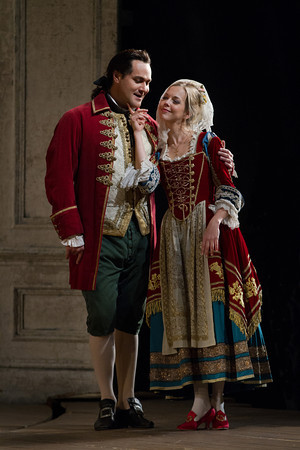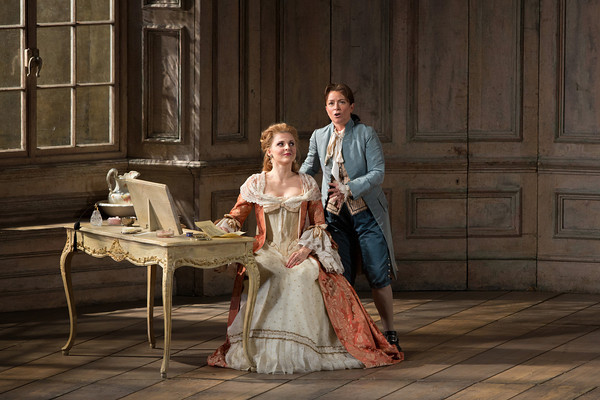I
would like to preface this review by stating that I was present at the opening
night week ago, but due to the extenuating circumstances created by Hurricane
Sandy I was unable to find the time, or computer to pull it off until this
morning. I would also like to extend my best wishes to those affected by the
hurricane and hope that they are undergoing a full recovery as soon as
possible.
I have always felt that a
Mozart opera does not work unless it is well sung and well staged. Most would
argue that this is the case with any opera, but for me Mozart’s work demand all
its players to step up their game all the more significantly. This case could
not be more evident than in an opera such as Nozze di Figaro where a flat staging and poor acting can make the complex
drama slow and mundane.
Fortunately, the Met
Opera has chosen a strong cast and adequate director for the proceedings. While
I did find a few flaws in the way the opera was put together, I can not help
but feel satisfied by how the evening went. I usually refrain from mentioning
other critics, but I could not help but notice how loathing they were toward
stage director Gregory Keller’s revival of Jonathon Miller’s production. Keller
had a few rough patches here and there, but I found his direction sufficient
and compelling at times. This Nozze was
surely filled with sexual innuendo, then again isn’t that the main thrust of
the opera’s conflict? Those complaining that Keller cares little for the
ambiguity of the work should take a look at his final direction after the
Countess forgives the Count and they prepare for a reconciliatory kiss. It is a
moment of pure tension and the fact that he never gives us the cathartic
release suggests deeper issues in this marriage.
To suggest this was a
perfect directorial turn would be wrong. During Cherubino’s escape in Act 2,
Mojca Ermann’s Susanna and Christine Schafer’s Cherubino stood frozen on stage
looking quite uncomfortable. It took a great deal of energy from the
proceedings and looked rather under rehearsed. Aside from that I did not really
experience any overwhelmingly poor choices that would degenerate Mozart’s great
opera to vulgarity. Susanna and Marcellina engage in a cat fight to end the
second Act, but I think it was comic in execution. I was also thrilled at the
choice to cut the Act 4 arias of Basilio and Marcellina as it helped move the
drama forward rather than killing its momentum.
Ildar Abdrazakov was a
standout in the title role of Figaro. He carried a rather calm swagger about
him and looked like the innocent well-meaning good guy at all times. As the
opera progressed, his Figaro started becoming more of a child as he would jump
into his mother’s lap or jump at her feet upon hearing of Susanna’s infidelity.
He sang with lush tone that rang through the theater. His final aria in which
he sings of woman’s infidelity showed off the clarity in his lower range. After
watching his uninspired turn last season in Anna
Bolena I was happy to him back at top form in Nozze.
Mojca Erdmann draws the
ire of the critics for no good reason in my opinion. She has a sweet voice that
also has great volume and depth. Throw in her solid acting skills and this is
the complete package that every opera house is currently clamoring for. She can
sound a bit pitchy in her upper range, but the elegance with which she sings
(particularly in her seductive final aria) really made her a formidable
Susanna. Her commanding stage presence (save for the aforementioned awkward
moment) made her the center of the performance for long stretches.
Gerald Finley is one of
the top Mozartians out there. I was a bit surprised that his voice was not as
large as I imagined, but his singing was confident and passionate all the same.
He also had a confident swagger about him that really gave his Count power. As
the opera drew to a close he sang the glorious lines “Perdona Contessa” with a
heart wrenching pianissimo that was easily one of the highlights of the night.
The warmth he emanated easily exhibited one of the more sincere emotional moments
in the score and of the night.
His Countess was a strong
Maija Kovalevska who sang with a gorgeous full sound that has a dark edge to
it. She seemed to have some tempo issues in her arias, particularly her second
one “Dove Sono,” but she eased into it and delivered fluid singing that rang of
emotional depth. Her Countess tended to be more on the girly side, almost as if
she was releasing her suppressed impulses as she teamed up with Susanna to save
her marriage. It might have been a bit much at times, but it certainly added to
the complexity of the character. Her final moments in which she forgives
Finley’s count matched the splendor of his warmth and sincerity vocally.
Christine Schafer had a
magnificent night as Cherubino. She may not have a massive voice, but her
singing is smooth and nuanced. I was particularly blown away by her decision to
sing the “Voi che sapete” piano (soft) the second time around. But it matched
the increasing intensity of the moment as Schafer’s Cherubino slowly inched toward
his desire object of affection: the Countess. It was riveting rendition and
easily of the standout performances of the evening.
The other cast members
(Maurizio Muraro as Doctor
Bartolo, Margaret Lattimore as Marcellina, John Graham-Hall debuting at the Met
as Don Basillio, Tony Stevensen as Don Curzio, and Ashley Emerson as Barbarina)
added strong renditions of their roles to fill out a satisfying evening.
Conductor David
Robertson and Pianist Dan Saunders were splendid in accompanying the cast. A piano
in a Mozart opera nowadays seems strange and out of place, but it was far from
bothersome on this evening. In many ways, the wholesome sound of the piano gave
the dry recitativo energy often lacking in sound of the harpsichord.
Robertson’s conducting
was swift and often understated. He was extremely supportive of his singers,
best exhibited during Kovalevska’s tempo difficulties in which he adjusted with
facility and de-emphasized the problem.
This Nozze is the latest in a series of
successful revivals. Thus far this season the Met has successfully revived Carmen, and Il Trovatore to tremendous
success without the need for a flashy cast. Add Nozze to that list.


I was at the same performance. I think this Mozart guy has a future. The set stunk but the music I like.
ReplyDelete